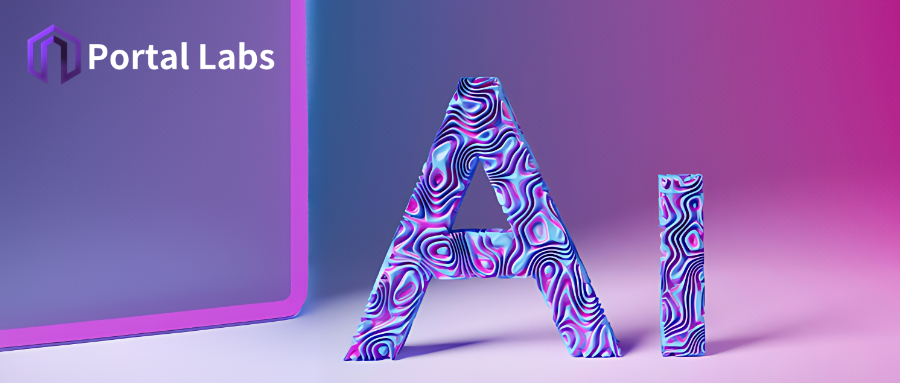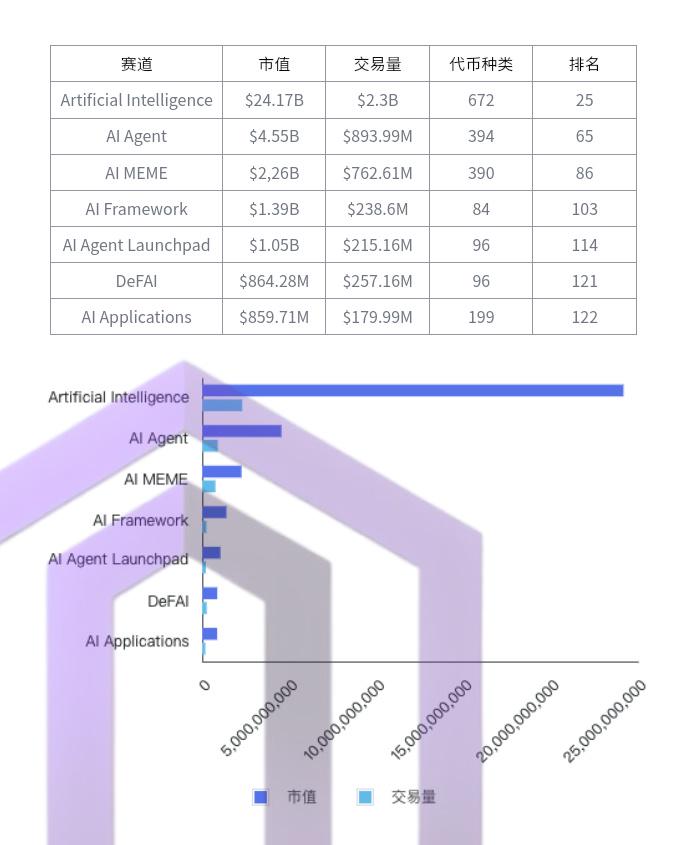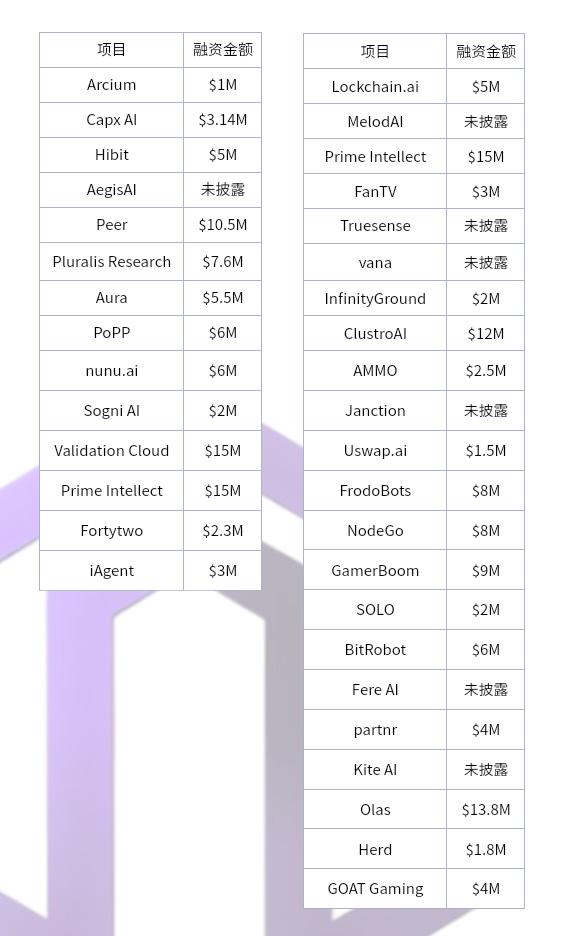
In the past two days, Portal Labs saw a news flash from PANews, which pointed out: According to the 2024 Runa Open Source Startup Index (ROSS Index) report released by European venture capital firm Runa Capital, more than half of the world's 20 hottest open source startups are closely related to AI, including Web3 projects represented by MyShell and Fuel.
In Web3, from AI+, which became popular at the end of 2023, to AI Agent in 2025, it can be said that any project that does not have some AI elements is "out of place".
To talk about how popular the current Web3 and AI tags are, let’s first look at a set of data (at the time of writing):

The data in the table above comes from the classification of Coingecko. It can be found that although the concept of AI+ has only been around for less than two years, it has already surpassed many mature tracks in terms of project volume/token types, market value and 24h trading volume. Of course, this cannot fully demonstrate the popularity of AI+.
Let's look at another set of data:

This is the financing data of the AI track from February to March compiled by Portal Labs from Rootdata and PANews.
It can be found that there were 22 AI track financings in February, with a known total financing amount exceeding US$97.6 million, of which the highest financing amount was US$15 million; March was relatively less, with 14 financings as of the time of writing, with a known total financing amount exceeding US$82.04 million, and the highest financing amount was also US$15 million.
At the same time, looking at the overall number of financings, there are basically at least 3 AI track project financings every week, accounting for about 10%.
In addition, from the perspective of investors, although many financings are seed rounds, community rounds, or strategic financings, we can also see many well-known venture capital firms, such as Meow, IDG Capital, YZi Labs (formerly Binance Labs), Animoca Brands, Amber Group, DWF Labs, and Sequoia China.
Therefore, whether in terms of proportion, financing amount, or investor quality, financing in the AI+ track can be regarded as a relatively outstanding achievement in an emerging track.
So, why is Web3 so optimistic about AI+? Let’s break it down a little bit, what is the most popular AI Agent at the moment?
In addition to macro-environmental factors, the core reason is that AI Agent is very consistent with the needs of Web3:
A natural extension of the concept of decentralization
The core concept of Web3 is "decentralization" - no longer relying on centralized platforms, but realizing autonomous management of assets and permissions through smart contracts and distributed networks. AI Agent is the natural extension of this concept.
Unlike traditional AI, AI Agent is no longer a tool controlled by a centralized organization, but an "intelligent entity" that can run autonomously on the blockchain network. It has its own on-chain identity, wallet, and assets, and can complete data access, task execution, asset management and other behaviors through on-chain protocols.
This means that AI Agents no longer rely on any single platform license, but can work together with human users or other Agents as independent participants in the Web3 network to complete governance voting, protocol calls, and even DeFi operations. As a16z pointed out: "AI agents are moving from passive tools to active market actors."
AI Agent makes "decentralization" not only belong to humans, but also extends to "machine participants".
The inevitable convergence of technological development trends
As AI technology continues to evolve, the rapid maturity of technologies such as GPT large models, Agent frameworks, TEE, and ZKP has cleared the way for the implementation of AI Agents. Web3 provides the three major infrastructures required for autonomous operation of AI:
Identity system : Through DID and on-chain signature, AI Agent can have an independent "identity" and access any protocol;
Value system : On-chain wallet and asset mechanism, enabling AI Agent to manage funds, pay Gas, and obtain incentives;
Execution system : Smart contracts and decentralized networks that enable it to automatically call protocols and execute on-chain tasks.
The technological trend is transitioning from "humans issuing instructions and AI executing" to "AI acting autonomously and verification on the chain", and Web3 is the only ecosystem that can support this closed loop.
Web3 users increasingly seek simplification
From the user's perspective, whether ordinary players or high-net-worth investors, they often face three major challenges when participating in Web3:
Complicated operation process : participating in airdrops, deploying contracts, and on-chain interactions are cumbersome;
The knowledge threshold is relatively high : the protocol rules are complicated, and ordinary users are often discouraged;
High attention and time costs : On-chain events change quickly and there are many on-chain interactions, which almost requires "24/7 on-call".
AI Agent can provide practical supplements in these areas:
It can automatically execute actions such as contract interaction, pending orders or batch authorization according to set strategies; it can help you monitor wallet risks, dApp changes, and changes in airdrop conditions in real time; it can also assist in extracting data and summarizing information from platforms such as Twitter, Discord, and Dune.
For investors with high daily activity or large amounts of capital, AI Agent is like an "executive assistant": helping you save time, reduce operational errors, and seize on-chain opportunities.
Conclusion: AI Agent is not just a new concept
AI Agent is not another "new trend" in Web3, it is more like a belated feature launch .
In the past, the Web3 world has been constantly telling beautiful stories about "decentralized finance", "data rights confirmation", and "user sovereignty", but many narratives have always remained at the level of concepts and infrastructure, or even the speculation that everyone has been talking about recently, and there is always a lack of the last mile bridge to the daily use and personal scenarios of real users.
Now, the emergence of AI Agent provides just such a path: it no longer emphasizes concepts, but uses "tooled forms" to respond to users' real operational anxiety and energy allocation difficulties, allowing the value logic of Web3 to be "felt" by an ordinary user for the first time.
If DeFi, NFT, and DAO are early attempts at the ideal of decentralization, then AI Agent is likely to connect all of them into a one-stop interface that users can "use".
We may be entering a stage where Web3 narratives are no longer just a matter of imagination, but can be “used”.











